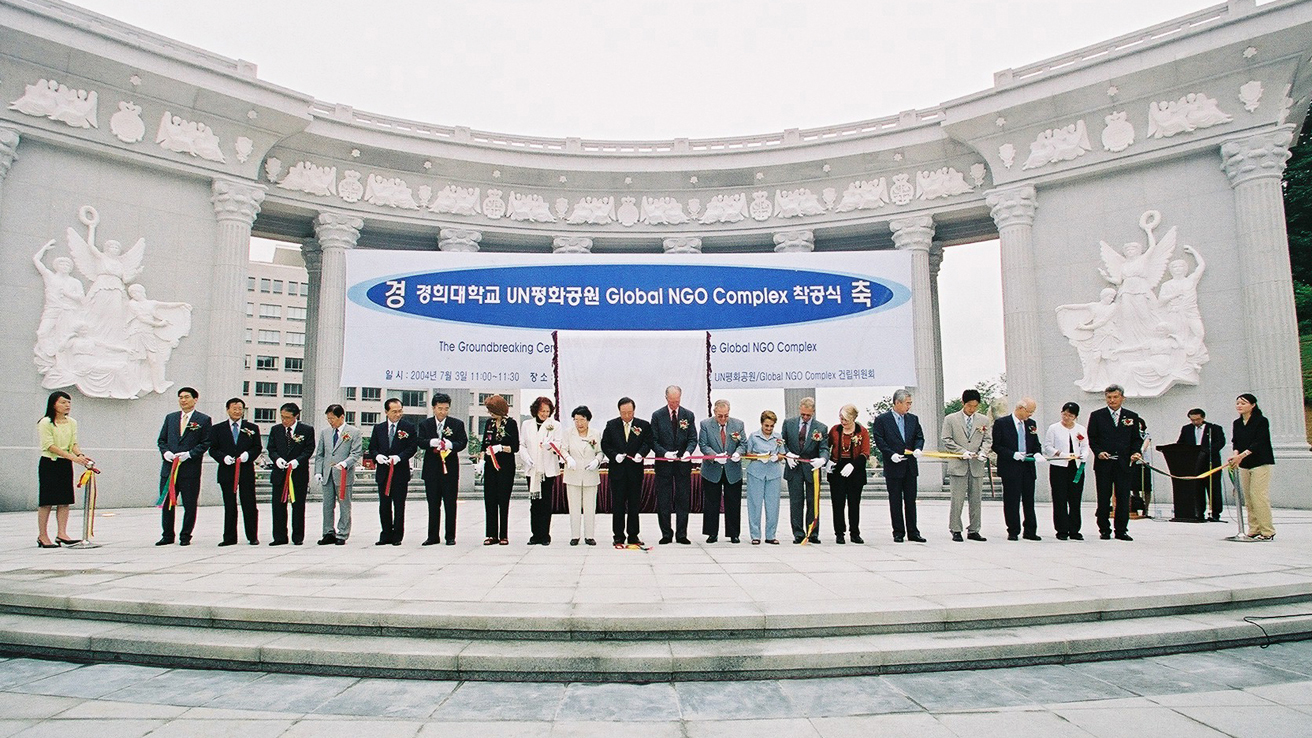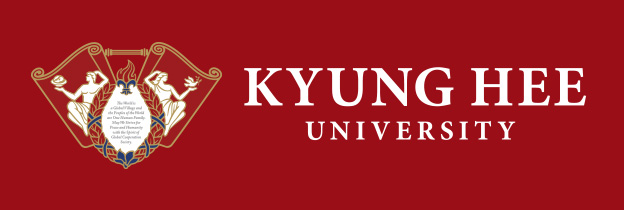UN Peace Park
Outline

Following the 1999 Seoul International Conference of NGOs, Kyung Hee University began the establishment of the UN Peace Park and the Global NGO Complex (GNC) with the official recognition of former UN Secretary-Generals Boutros Boutros-Ghali and Kofi Annan. The UN Peace Park will be constructed on the Global Campus and the GNC will be located within this park.
The UN Peace Park and GNC will transform this area into an international center of education, research, and practice in which the UN and the world society can form the mold of permanent peace and mutual prosperity. This area will be developed into an arena for producing solutions for global issues such as human rights, the environment, development, and peace.
Activities
- Promoting cooperation and exchange within the world community and building foundations for solidarity.
- Developing as a forum for dialogue, communication, and solidarity among the UN, international organizations, governments, NGOs, industry, academia, and the public.
- Providing information and materials to strengthen relations among NGOs.
- Building a research and cooperation network among the various sectors of society such as civic society, culture and the arts, and industry.
- Creating an international NGO network.
- Establishing universally shared values for peace and mutual prosperity.
- Seeking a human-centered global governance.
- Creating a culture of peace through the interaction of diverse cultures.
- Providing a space for communication and cooperation that transcends nationality, ethnicity, ideologies, and religions.
- Realizing a Global Common Society.
Major Facilities
- The UN Peace Park
- Memorial Hall, Peace Square, Peace Castle
- Amphitheater, Peace Garden
- Global NGO Complex (GNC)
- International NGO Center, GCS International, the Graduate Institute of Peace Studies, International NGO Research Center
- Kyung Hee Cyber University, Internet broadcasting company
- International House


Main Programs
East Asian Chamber for UN/NGO/Business Partnership
In light of the rise of East Asia as the axis of a new civilization in this current age, the East Asian Chamber for UN/NGO/Business Partnership will seek dialogue and communication between East Asia and Western societies that have historically led the advancement of modern civilization. In particular, partnerships with the UN, NGOs, and businesses will be central to opening up a space for new collaboration and cooperation for the global community.
Goals
- To strengthen partnerships among the UN, CoNGO, and businesses
- To expand the reach of the Seoul Millennium Declaration as set by the 1999 Seoul International Conference of NGOs and the UN's Millennium Development Goals (MDGs) set in 2000
Projects
- Chamber Academy: Short-term education and training program
- Web Networking: An online network to strengthen the East Asian Chamber
Korean Peninsula After Ideology
In this post-ideological 21st century, the East-West ideological struggles of the 20th century are still tangible and affect the political atmosphere of the Korean Peninsula. The "Korea Peninsula After Ideology" forum seeks to shed light on the role and function of the Korean Peninsula in creating a new global civilization that fulfills the needs of our post-ideological reality.
Goals
- To investigate the role of the Korean Peninsula on 21st century civilization
- To research and publish materials about the creation and evolution of civilizations, and the dynamic relationship between the human and society
Projects
- Publication of The Korean Peninsula and Civilization
- Administration of the "Past, Present, and Future of the Korean Peninsula" education program
World Congress for NGO Studies
The World Congress for NGO Studies is an open space for research and exchange among the world's scholars and practitioners on the needs of global society in the 21st century. The congress is open once every four years and searches for new directions in NGO studies and solutions to the world's current affairs.
Goals
- To lay the academic foundations for NGO activities and to offer new directions in NGO studies
- To strengthen cooperation and exchange between NGO scholars and activists
Projects
- Quadrennial international conference for scholars and practitioners in NGO studies
- Publication of white papers and journals
Future Leaders Forum
The 21st century requires a new type of leadership and the increase in mutual exchange, cooperation, understanding, and trust among the world's governments, businesses, and civic organizations. As such, the Future Leaders Forum educates future leaders for a society of peace and mutual prosperity.
Goals
- To strengthen the planning capacities of governmental institutions, the financial sector, and civic organizations and to increase mutual understanding and cooperation
- To share a vision for building a future community of peace and mutual prosperity
Projects
- Dialogue for Future Leadership: short-term special lecture and tripartite debate session
- Vision Action 21: educational training program
- Publication of forum sourcebook
UN/NGO Archive
The UN/NGO Archive supports the Global NGO Complex (GNC) project and lays the foundations for research on the UN and NGOs by efficiently collecting and managing materials related to these institutions.
Goals
- To build a database of UN and NGO related materials to foster research
- To connect domestic and international UN and NGO related institutions to the GNC
Projects
- Management of the UN/NGO research database sharing system
- Management of the domestic and international Archives network
- Indexing materials by topic, country, and area
- Publication of a newsletter
-
Info
- Global Academy for Future Civilizations
- +82-2-961-0995
- gafc@khu.ac.kr

